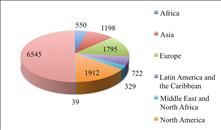 The recently released Pennsylvania University ‘Global Go To Think Tank Index’ has attracted a meaningful debate among Indian thinkers at home and abroad.
The recently released Pennsylvania University ‘Global Go To Think Tank Index’ has attracted a meaningful debate among Indian thinkers at home and abroad.
The worldwide attention has an ominous note, since India did not find a place in the Top 30 countries in terms of quality and impact.
Think Tanks play a major role in policy-making and the top Think Tanks of the world such as the Brookings Institution and Carnegie Endowment for International Peace (based in Washington DC), have contributed to policy-making in the US under Republican and Democrat presidents.
Think Tanks do not confine themselves to strategic and foreign policy issues but cover several sectors including education, finance, social development, employment and defence.
That is not the case in India.
Some government-funded Think Tanks in India are the exclusive preserve of retired military officials and others to warm their time so that they can find some work in the government and maintain their economic and social status.
However, it can be argued as a universal thing, lack of research and innovation and the absence of young talent (at least in most cases) is the bane of Think Tanks and their officials in India.
The NZ connection
What is the relevance of Indian Think Tanks to New Zealand?
The answer is obvious. Think Tanks that generate good policies and programmes and recommend proper action can strengthen bilateral relations. In the case of Indo-Kiwi relations, they could make valuable contributions to the ongoing negotiations for a Free Trade Agreement (FTA).
The relevance of New Zealand in India’s foreign policy has been discussed more in Indian Newslink as editorials, columns and news analyses than in any Indian Think Tank or other newspapers.
Obviously, continued discussion of issues such as bilateral trade, strategic polices and analyses requires sustained research and investment, which is lacking among both researchers and journalists in India.
The problem is that effective thinking has been substituted by market friendly values such as focusing more on Bollywood music and sports in the discourses of Indian media. There is little or no discussion on the findings of the Think Tanks.
Media apathy
For example, when New Zealand Prime Minister John Key visited India in June 2011, no newspaper or television channel initiated a serious discussion on Indo-New Zealand strategic relations or pushed the Indian government to seal the trade deal with New Zealand.
China was proactive and pushy when it signed a comprehensive FTA with New Zealand in April 2008.
There is an apparent apathy in undertaking study on the countries of the South Pacific, notably Fiji, with which India has had connections for almost 150 years. Yet, the traditional connection is conspicuous by its absence in Indian universities and Think Tanks.
I doubt if there is anyone in India is either qualified or interested in addressing the country’s policy towards the South Pacific.
It is ironical that an in-depth and coherent dissertation comes from an American student who visited Fiji for her fieldwork; there has been no such undertaking by any Indian scholar based in India.
The problem of not effectively thinking on serious issues has extended to our competitors who base their work more on popularity rather than on first-hand or original analysis.
If the media fails to draw informed and nuanced debate, it reflects in the Think Tanks. On the other hand, the complaint from the media is that the Think Tanks do not come out with any major policy initiatives.
Both may have valid points of view.
It is not so much to do with the institutions anymore but with the individuals.
There would be little meaning, leave alone progress, if individuals base their work on copy and paste both in media and Think Tanks.
Balaji Chandramohan is our correspondent based in New Delhi, India.
Global Distribution of Think Tanks
Source: ‘Global Go To Think Tank Index,’ University of Pennsylvania






